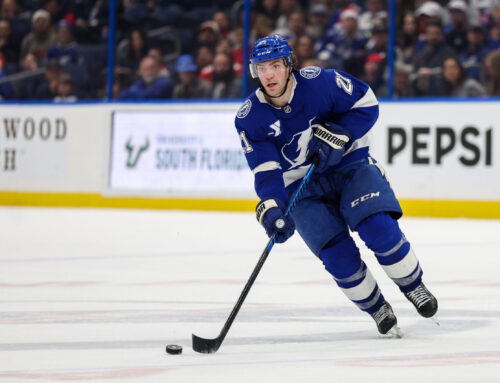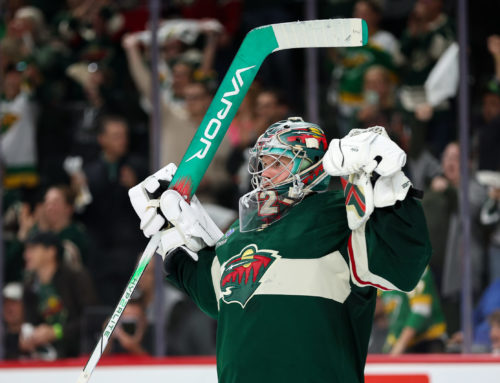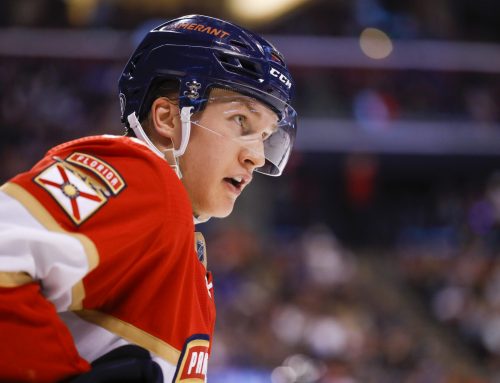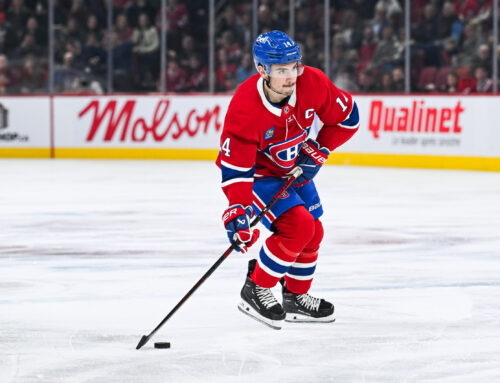
Which team will prevail – Team Canada or Team USA? Roos runs through it point by point to come up with a prediction
Thanks to everyone who read last week’s column on North America vs. Russia. We’re mere days from finding out if cage match was correct in pointing toward Team Russia as the winner. And we’re also less than seven days from the round one battle of Canada vs. USA, who split their exhibition contests and are the focus of today’s second special cage match in honor of the 2016 World Cup of Hockey.
Like last week I’ll pick a winner based on which team has the edge in side-by-side comparisons, while providing fantasy tidbits along the way. The good news is the average age for each team (Canada 28.69, USA 29.04) is close enough that, unlike last week, we won’t need to age-adjust data. So let’s dive in!
Track Record of Being on Trophy/Medal Winning Teams – HUGE ADVANTAGE TEAM CANADA
Although anything can happen in one game, when predicting who’ll prevail it’s nevertheless key to see which team’s players have a better track record of winning in analogous situations. After all, if they’ve been on teams that’ve won Stanley Cups or medals in international tournaments, then it’s all the more likely they can win early round World Cup games as well. Here’s how things stack up:
|
Team |
Stanley Cup Titles among players |
International Medals Won among players |
|
Canada |
12 |
82 (Gold = 66; Silver = 15; Bronze = 3) |
|
USA |
6 |
39 (Gold = 16; Silver = 13; Bronze = 10) |
I figured Canada would hold an edge, but not this wide — its players have twice as many Stanley Cups wins and total medals, and four times as many golds! Beyond that, only three of Team Canada’s players (Corey Crawford, Braden Holtby, Logan Couture) have never won an international medal, versus six (Dustin Byfuglien, Brandon Dubinsky, Matt Niskanen, Max Pacioretty, Blake Wheeler, Jonathan Quick) for Team USA. Simply put, there’s no way to sugarcoat the extent to which Canada has the advantage in this extremely important area.
FANTASY TAKEAWAYS – Focus on players with the least international experience, as they’re likely eager to make a strong showing, which in turn could help them hit the ground running in 2016-17. Goalies who log significant tournament minutes might end up with a lighter than normal workload during at least the first handful of weeks of the regular season, so poolies should watch for that, especially those in H2H leagues.
Leadership and Individual Accomplishments – HUGE ADVANTAGE TEAM CANADA
|
Team |
NHL Captains or Assistant Captains among skaters |
NHL Individual Trophies among players |
|
Canada |
70% (i.e., 14 of 20) |
28 |
|
USA |
45% (i.e., 9 of 20) |
9 |
Although the average ages on each team are virtually identical, the fact is nearly three quarters of Team Canada’s skaters are current NHL captains or assistant captains, compared to less than half for the US. Also, Canada’s players have collectively won three times as many individual trophies – an enormous gap which dwarfs even the two to one margin for team medals.
What’s more – two possible silver linings for the US can be easily discounted. First is the notion that with numerous leaders on Canada’s roster there could be a “too many chefs in the same kitchen” type of situation; however, given the number of golds they’ve won it’s clear their many captains and assistants can check any egos at the door. Also, over half the individual trophy wins among Team Canada were by just three players (Patrice Bergeron, Jonathan Toews, Sidney Crosby); however; inasmuch as all three will play key roles not only in the tournament as a whole but also in this particular game, that might not offer much solace to the US team either.
FANTASY TAKEAWAY – There’s reason for concern about band-aid boys who are hard-nosed, lead by example types (e.g., Brent Burns, Brandon Dubinsky, Ryan Kesler) going overboard in an effort to help their country emerge victorious. Doing so could increase their already elevated risk of getting injured or could lead to them perhaps playing through a minor ailment, which in either case could linger into the regular season.
Versatility and Roster Balance –SLIGHT ADVANTAGE TEAM USA
International tournaments are not all-star games, and are often won by teams who control play at both ends of the ice. So let’s look at 2015-16 data to see which squad, on paper, is most balanced:
|
Team |
Players with <45% Offensive Zone Starts |
Players with >55% Offensive Zone Starts |
Defensemen with >2:00 ice time per game both on the PP and PK |
Forwards with >2:00 ice time per game on the PP and > 1:30 on the PK |
|
Canada |
1 (D) |
7 (all F) |
6 |
5 |
|
USA |
8 (4 D, 4 F) |
6 (all F) |
5 |
2 |
Clearly there was a focus on versatility in assembling the US roster, with its players more used to skating in their own end. But Canada has more defensemen and forwards equally adept on the PP and PK. The takeaway is Canada is built a bit more to score and the US to prevent that from happening, making this a neutral category.
FANTASY TAKEAWAY – Watch the roles taken on by players for their respective teams, since you could see someone shine in an unfamiliar situation. Take Sean Couturier, who posted six points in ten games for Canada at the 2015 World Championships and stayed in step with offensively elite countrymen. Fast forward to 2015-16, and Couturier parlayed that into 39 points in only 63 games, with 31 coming in his last 40 contests. On the flip side, watch Marc-Edouard Vlasic closely. At age 28, Vlasic had a scoring explosion last season; but as the only Team Canada defenseman with an OZ% below 45%, he’ll likely play a strictly defensive role at the World Cup, and that could trickle into the regular season.
Team Dynamic– SIGNIFICANT ADVANTAGE TEAM CANADA
Among Canada, one set of four players (Brent Burns, Logan Couture, Joe Thornton, Vlasic) and six duos (Jonathan Toews, Corey Crawford; Corey Perry, Ryan Getzlaf; Shea Weber, Carey Price; Alex Pietrangelo, Jay Bouwmeester; Patrice Bergeron, Brad Marchand; Drew Doughty, Jake Muzzin) are currently on the same “real-life” squad, while for Team USA it’s one set of three players (John Carlson, T.J. Oshie, Matt Niskanen) and five duos (Corey Schneider, Kyle Palmieri; Dustin Byfuglien, Blake Wheeler; Jack Johnson, Brandon Dubinsky; Ryan McDonagh, Derek Stepan; Ryan Suter, Zach Parise). Thus, 16 players on Team Canada and 13 on Team USA will have one or more “real-life” teammates, except Weber has yet to play with Price in the NHL, so I think they should be omitted, leaving 14 for Canada and 13 for USA.
But the gap widens in Canada’s favor when looking at how familiar these teammates are, with two sets of rearguards (Pietrangelo, Bouwmeester; Doughty, Muzzin) who are “real-life” partners plus two sets of forwards who regularly skate together (Bergeron, Marchand; Perry, Getzlaf), whereas nearly all Team USA teammates play different positions (e.g., goalie and defense; defense and forward) and the only ”real-life” teammates who share the same position(Carlson, Niskanen) were on the ice together for just 27 total minutes at 5×5 during all of last season. On top of that, for five of the six NHL squads with real-life teammates on Team Canada at least two of the players have been NHL teammates for 4-plus years, with it being six seasons for Crawford and Toews and Bergeron and Marchand and ten seasons for Perry and Getzlaf. For Team USA, although four sets of teammates have been together on the same squad for four seasons, that’s the longest duration overall.
FANTASY TAKEAWAYS – Make note of real-life teammates, especially those likely to also play alongside each other in the regular season, as they could get a nice boost heading into 2016-17. Although Burns and Vlasic aren’t a regular defensive pairing, just as Thornton and Couture tend not to skate together at even strength, the four sometimes shared the ice on the PP, and thus if they form a PP unit during the tournament that could provide a boost to SJ’s PP into 2016-17. To some extent, the same 2016-17 PP boost could potentially occur for Stepan and McDonagh, Wheeler and Byfuglien, plus Suter and Parise.
Pressure and Who Wants It More – SLIGHT ADVANTAGE TEAM USA
The game is being played in Toronto, amounting to essentially home-ice advantage for Team Canada; but the crowd will expect nothing short of gold, which will ratchet up the pressure even for this single game. Meanwhile, the location of the game could incent the US (including current Toronto forward James van Riemsdyk) to play spoiler. Moreover, the fact that – as noted above – Team USA has twice as many players who’ve never won an international medal of any kind, should serve as added motivation.
In terms of contract status (which should coax even better effort from players with deals expiring within the next year), it’s a markedly different situation from last week as there are only five players poised to become UFAs this summer and none unsigned for 2016. And although the slight edge goes to Team Canada, with three 2017 UFAs to be (Brad Marchand, Joe Thornton, Brent Burns) versus Team USA’s two (Ben Bishop, T.J. Oshie), I nevertheless give a slight edge to the US in this overall area, given the totality of factors.
FANTASY TAKEAWAYS –Among the five players set to become UFAs after 2016-17, probably the key one to watch is Bishop, who’d love to make a strong showing on such a major stage. Of course first he has to make sure he gets starts, which is not guaranteed given USA’s other quality netminders. Otherwise, it’s Burns, Oshie and Marchand who’ll be looking to pad their resumes prior to what will likely be their last major pay days. On the flip side, Thornton won’t be signing a long term deal, so his status as a UFA to be won’t be as much of a major factor/motivator.
Coaching Staff – SLIGHT ADVANTAGE TEAM USA
Both teams will utilize one head coach and several assistants – five for the US, four for Canada. Among the staffs, Team Canada has twice as many Stanley Cup wins (four vs. two) but Team USA has more total international medals (six vs. five), with me only counting wins that occurred when each staff member was either a player or head coach. Also, members of Team Canada’s staff are “real-life” head coaches of four players on its squad, versus three players for whom a Team USA staff member is their NHL coach.
John Tortorella is notorious for his hard-nosed style, which has produced short term results in the past. Plus, his comments regarding the US National Anthem might stir up patriotic sentiment among players. Team USA’s assistants include two current NHL head coaches, but also two former players with no coaching experience at the NHL level. While that might seem like a negative a first glance, non-NHL perspectives could prove useful and help Team USA think “outside the box.”
For Canada, Mike Babcock is widely regarded as a world class coach, as are all other members of the Team Canada staff; however, playing in front of not only fans from his home country but his home team could test Babcock’s nerves at least somewhat. Overall, I think it’s safe to say that Team USA might enjoy a very slight advantage in this area.
Who Wins?
It’s unquestionably Canada, with its advantage in three areas, including an enormous edge in two areas, and USA’s only slight advantage in three. Although of course anything can happen in one game, and the US – realizing the talent edge that Canada has on paper – went about selecting a team that can play both ends of the ice in hopes of negating Canada’s firepower, the reality is – regardless of what happened in last week’s exhibitions – if this match was played ten separate times Canada should win roughly eight of the ten given its strong advantages in experience and leadership.
13 Comments
Leave A Comment
You must be logged in to post a comment.





 CAR
CAR WPG
WPG PHI
PHI ANA
ANA BUF
BUF CHI
CHI COL
COL T.B
T.B
 L.A
L.A

What?! Advantage USA on coaching of all things? Canada has arguably the best hockey coach in the world. He’s the highest-paid and was perhaps the most sought-after “free agent” coach in NHL history. The analytics show a notable bump when Babcock takes over the team. Almost all of the exact opposite statements are true of Tortorella. He’s incredibly lucky to have an NHL job, and the stats show an equally notable drop in on-ice performance when he takes over a team. The rest of the article seems reasonable, but to state Tortorella is an advantage over Babcock doesn’t pass the laugh test. The assistants matter, too, but not to enough of a degree to overcome this, even if USA had a notable advantage there (which I don’t see either).
I never said Torts has an advantage over Babcock. My concern about Canada is the “let down” factor of playing in Toronto (where Babcock coaches the Maple Leafs) plus Canada’s assistants being strong minded enough to cause a too many chefs situation. In contrast, there’s a clear hierarchy for the US, plus some “outside the box” thinking in Housley and Gordon. Plus, the USA coaches have more overall international medals, which is a big deal.
I’m not a fan of Torts at all, but I looked at this as an overall picture and I think it is was correct to tilt the scales every so slightly toward the US team in this area.
I definitely appreciate the comment though, even if we don’t apparently see eye to eye in this specific area.
Fair enough, thanks for your response. Hope it didn’t read like I was screaming at you. :)
So the crux of the argument here is in how heavily one weighs the series of intangible factors you describe. Although I believe they do have an effect on the analysis for sure, I’d say they are ultimately secondary to the statistically verifiable impact of the head coaches on their respective teams. That Babcock is clearly and simply such a better coach than Torts in my estimation outweighs any home town pressure or potential “outside the box” thinking from assistants.
Appreciate the article! Cheers.
No worries, and no offense taken. I’m glad to get any comments and welcome ones that “push back.” In fairiness, the medals won stat isn’t an intangible. Also, Torts is tasked with coaching a new group of players in a new situation, and although his long term record pales in comparison to Babcock’s, we can see that he’s does have a track record of good short terms results, having led Tampa Bay to more wins in each of his first three full seasons and the same with the Rangers when he took over there.
I agree w Scrub, excellent piece but i think you drifted into the realm of “hunch” re coaching, which is similar to the line of reasoning by this guy: http://www.espn.com/nhl/story/_/id/17532204/nhl-world-cup-hockey-why-team-usa-beat-team-canada The reality is, Babcock is by every objective measure a better coach, so it’s really a reach in an otherwise objective analysis to suddenly go with a hunch. If Babs was the type who would cave under pressure we would have seen it at 2010 Olympics, which was massively more tense than anything about to happen in TO. Torts is a clown, first sign of adversity and I wouldn’t be surprised if he lost the room; highly-paid vets won’t put up with his bullsh*t in a tournament that’s more about money and the NHL brand as opposed to national pride. (I remember a smiling, condescending Jeremy Roenick saying after US lost to Canada in Olympic final saying, “aw, they care so much more about this than we do” or something along those lines. In other words, “we weren’t really trying that hard.” What a goof.)
That being said, Larry and scrub – IS Babock the better coach for a five-game set? I won’t argue he’s miles better over 82 games. Or even 40 games. But when we get down to just a couple of games, can the case be made nearly as strong?
And on the other hand, does Torts have enough time to gather the steam needed to become a true clown?
I say “nay”! You want spirit, bluster, and inspiration for short tournaments. And that’s the calling card of Tortorella. The difference between the two coaches becomes negligible…and that means Rick’s point about ‘too many cooks’ and ‘proper hierarchy’ mean oh so much more. I’m giving this one to Rick!
Slipping $20 note into Dobber’s pocket offline……
wouldn’t the past two Olympics prove this isn’t an issue for Babcock and his staff?
Well, Rick and Dobber, in the end, the US outhits Canada 38-14, and out-block Canada 20-13 (Torts-style), while Canada skates and wins. It wasn’t a blowout by any stretch, but I’d suggest the evidence is there to suggest Canada had superior bench management.
So, sorry, chaps, I can’t help myself… :)
https://uploads.disquscdn.com/images/b87eb2aae2db2506b6493399771a3896f76860251665d977bfb7070040bd4b0e.jpg
Well, Rick and Dobber, in the end, the US outhits Canada 38-14, and out-block Canada 20-13 (Torts-style), while Canada skates and wins. It wasn’t a blowout by any stretch, but I’d suggest the evidence is there to suggest Canada had superior bench management.
So, sorry, chaps, I can’t help myself… :)
https://uploads.disquscdn.com/images/b87eb2aae2db2506b6493399771a3896f76860251665d977bfb7070040bd4b0e.jpg
It’s okay man.
Just to be clear – I was arguing that the gap between the two coaches in a single game wasn’t huge. And that it was worth discussing. Not that Torts was indeed better.
Turns out the gap was huge, and uh…not worth discussing. Enjoy your tea, Kermit!
anything can happen in sports in a short tournament, in hockey all u need is a lucky bounce or two and a hot goalie. So USA may come back and win it all. But I find it interesting that they came out flat in a must-win game yesterday without very much “spirit and bluster.” If we’re going with hunches here, I’ll stick with mine, which is that Torts is an assh*le who is overrated re. his ability to get the most out of teams. Calling out 1 of his best scorers during exhibition play, and sitting out Byfuglien? It’s all about Torts. His act worked for a while, I suppose, but word gets out around the league. Second, those lauding team usa’s makeup seem to forget Canada brought in some role/character players in 2006 (Ryan Smith, Draper etc) and crapped the bed. We learned after that to go skill, at least at forward position. (I agree with Cherry — this team would have been incredible with Letang on D. He’s underrated defensively imho).
Given the Canada vs Czech and USA vs Europe results, all I can say is…
(I may wind up eating this after the Canada-US game, we’ll see…)